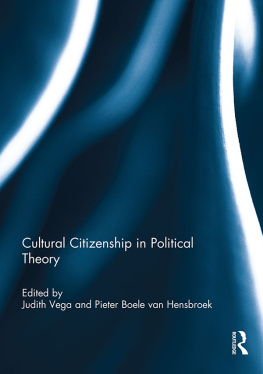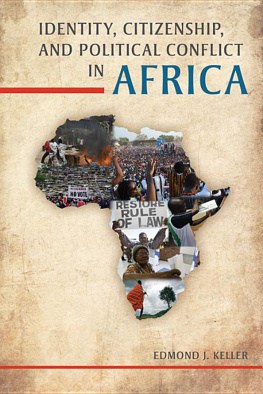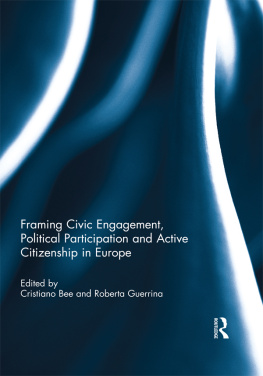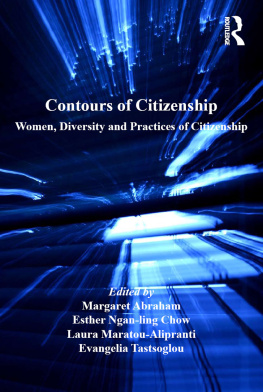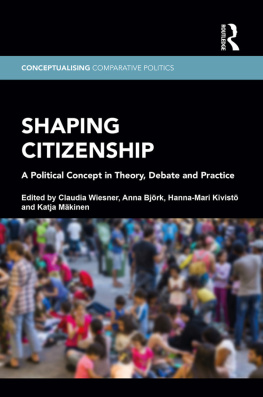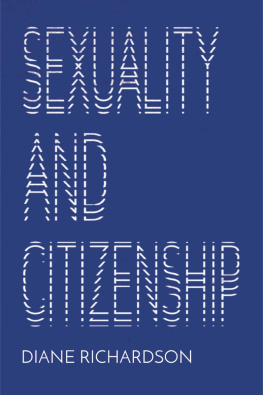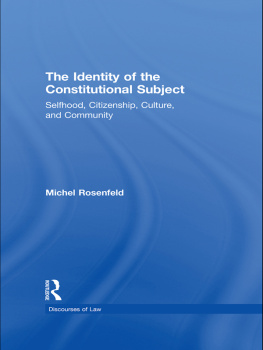Cultural Citizenship in Political Theory
Cultural citizenship is a recently developed concept in discussions on multicultural society, the media society, consumerism, and political theory. It addresses the various ways in which citizenship is becoming mixed up with culture, either through globalisation processes (involving new cultural identities, immigrations, culture industries) or by increasingly life-style oriented types of action. In the face of these challenges, the good old notion of citizenship seems in need of some assistance.
This book takes a fresh look at cultural citizenship by exploring it from political-philosophical angles. It seeks to develop explicitly normative perspectives on the present debates around culture. What do the novel national and global constellations mean with respect to inclusion and exclusion, participation and marginalisation, political rights and mere cultural practices? Moreover, this volumes authors aim to develop notions of cultural citizenship beyond the liberal political paradigm that associates it with cultural rights, cultural capital or the consumer-citizen. They engage the concept to re-think politics in both its meanings of citizenship practices and governance practices vis--vis citizens. The authors address a range of pertinent issues, exploring historical as well as present-day understandings, and theoretical as well as policy applications of the notion of cultural citizenship.
This book was originally published as a special issue of Citizenship Studies.
Judith Vega is Lecturer in Social and Political Philosophy at the University of Groningen. Her research addresses crossroads of politics and culture, viz. social justice and recognition, republicanism and feminism, and representations of urban life. She was editor-in-chief of the Dutch academic journal Tijdschrift voor Genderstudies.
Pieter Boele van Hensbroek is Lecturer in Development Studies and Political Philosophy at the University of Groningen. He studies political thought in non-Western societies, was editor of Quest: An African Journal of Philosophy and works at Globalisation Studies Groningen (GSG).
Cultural Citizenship in Political Theory
Edited by
Judith Vega and Pieter Boele van Hensbroek
First published 2012
by Routledge
2 Park Square, Milton Park, Abingdon, Oxon, OX14 4RN
Simultaneously published in the USA and Canada
by Routledge
711 Third Avenue, New York, NY 10017
Routledge is an imprint of the Taylor & Francis Group, an informa business
2012 Taylor & Francis
This book is a reproduction of Citizenship Studies, vol. 10, nr. 3. The Publisher requests to those authors who may be citing this book to state, also, the bibliographical details of the special issue on which the book was based.
All rights reserved. No part of this book may be reprinted or reproduced or utilised in any form or by any electronic, mechanical, or other means, now known or hereafter invented, including photocopying and recording, or in any information storage or retrieval system, without permission in writing from the publishers.
Trademark notice: Product or corporate names may be trademarks or registered trademarks, and are used only for identification and explanation without intent to infringe.
British Library Cataloguing in Publication Data
A catalogue record for this book is available from the British Library
ISBN13: 978-0-415-69648-7
Disclaimer
The publisher would like to make readers aware that the chapters in this book are referred to as articles as they had been in the special issue. The publisher accepts responsibility for any inconsistencies that may have arisen in the course of preparing this volume for print.
Judith Vega and Pieter Boele van Hensbroek
Department of Practical Philosophy, Faculty of Philosophy, University of Groningen, The Netherlands
Cultural citizenship has been receiving quite some attention for over a decade now. The concept has appeared in fields like migration studies, media studies, arts education, museology, cultural policy, and at times in general cultural studies and sociology.1 One might even be tempted to speak of a new cult on cit, if one allows such American shorthand, but we will not be flippant. We think that the concept has elicited interesting debates, and has pertinent contributions to offer to the theory and practice of citizenship. This special issue will place the concept specifically within a political-philosophical context, which allows us to probe into a range of analytical as well as normative issues that the concept raises. The articles collected here elucidate how the concept fares in different political-philosophical milieus, among which the liberal, Marxist, Arendtian and (otherwise) republican ones.
In this introduction, we reconstruct a brief history of the intellectual discussions that led up to the current, explicit concept. We will identify several pertinent questions and tensions in the debates. We will furthermore argue our own angle, pleading a political-theoretical approach beyond the, according to us, too narrow conceptualisation of cultural citizenship that ensued from its elaboration in a liberal theoretical framework. We finally explain how such an angle is illustrated by the various contributions to this special issue.2
To talk about cultural citizenship means to articulate some kind of link between culture and citizenship. The concept thus broaches a very general problematic, as it is not too difficult to bring several such links to mind. But it also broaches a very specific problematic. It brings citizenship into a new area of concerns, compared to its classic conceptualisations it infers that citizenship has other than merely political connotations. Such an extended meaning constitutes a challenge for political philosophy. How do we deal with an originally typical political concept as citizenship suddenly going cultural? It is not self-evident that this would be an easy endeavour. Brian Turner (2001, p. 12) was aware of this challenge when he wrote: The absence of a robust tradition of political theory on culture and citizenship is problematic. The articles in this issue, however, beg to differ. They evidence the ways in which various political theories and philosophies have reflected on some conception of cultural citizenship, if not the concept, and explore a number of angles both historical and contemporary ones.
What do the many conceivable links between culture and citizenship look like? From what debates and practices did the concept of cultural citizenship result? Let us survey the sundry options, as cultural citizens actually appear in many guises. They may be citizens with cultural claims on politics, like immigrants from non-western countries, women with headscarves, (other kinds of) feminists, gay rights activists, and so on. They may be citizens involved in the pluralisation and interculturalisation of the arts, attempting to increase social participation or community bonding. They may also be the citizens of the media society, glued to the television or the internet, or of consumerism, celebrating lifestyle over politics, or turning politics into a lifestyle. They, alternatively, appear in (e.g. feminist) criticisms of the classical citizen as an unembodied, rational subject, who left subjectivity behind in order to become a universal citizen-being, and who is politically active only in a narrow meaning of politics. The critique takes issue with the unwarranted claim to universality of such subjects, blind to the always particular (cultural) character of their politics. This last perspective is conceptually the most radical: when it comes to the crunch, everyone is a cultural citizen.

